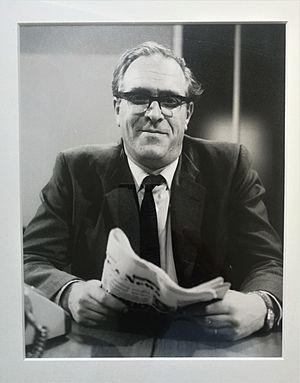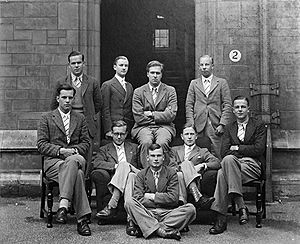Pit Corder facts for kids
Stephen Pit Corder (born October 6, 1918 – died January 27, 1990) was a very important professor. He taught at Edinburgh University in Scotland. He was famous for his work in a field called applied linguistics. This field studies how people learn and use languages. Pit Corder helped us understand how people learn languages by looking at their mistakes. He was also the first leader of the British Association for Applied Linguistics from 1967 to 1970. He played a big part in growing the study of applied linguistics in the United Kingdom.
Contents
Pit Corder's Early Life
Pit Corder was born in York, England. His family belonged to a group called the Quakers. His father was an English teacher, and his mother was Dutch.
Pit went to Bootham School, a Quaker boarding school near York. His father also taught there. After that, he studied modern languages at Merton College, Oxford, from 1936 to 1939.
Pit Corder's War Service
After college, Corder taught at a school. During World War II, he joined the Friends' Ambulance Unit. This group helped people who were hurt or sick during the war. He served in Finland and Egypt. Pit Corder was a conscientious objector, which meant he believed it was wrong to fight in the war. So, he helped in other ways instead of joining the military. In 1946, he married Nancy Procter, and they had three children.
Pit Corder's Career in Linguistics
After the war, Pit Corder worked for the British Council. This organization helps share British culture and language around the world. He worked in places like Austria, Turkey, Jamaica, and Colombia. During this time, he taught classes. He also designed new language courses and created new materials for teaching languages.
In 1957, Corder joined the school of applied linguistics at the University of Edinburgh. The British Council needed experts in applied linguistics. So, Corder studied to get a special diploma in this field. After a year of study, the British Council sent him to Nigeria. There, he helped create English language teaching materials for television.
Leading Applied Linguistics
Pit Corder later left the British Council. He started teaching at Leeds University. In 1964, he became the director of the school of applied linguistics at the University of Edinburgh. He stayed at Edinburgh University for the rest of his career. He helped set up a new department there dedicated to applied linguistics.
Corder was also the very first president of the British Association for Applied Linguistics. He held this important role from 1967 to 1970.
Pit Corder's Important Books
Pit Corder wrote several important books and articles. These publications greatly influenced the study of applied linguistics.
- Corder, S. P. (1960) An intermediate English practice book. Longman.
- Corder, S. P. (1967) "The significance of learner's errors." International Review of Applied Linguistics, 5: 161–170.
- Corder, S. P. (1973) Introducing applied linguistics. Penguin Education.
- Corder, S. P. (1981) Error Analysis and Interlanguage. Oxford University Press.
Understanding Language Errors
In his book Error Analysis and Interlanguage, Corder shared a new idea. He suggested that learning a second language is a journey. We can understand this journey by looking at the mistakes learners make. He believed these mistakes are not just "wrong." Instead, they are signs that the learner is actively developing their language skills.
Corder argued that the language a learner uses, even with mistakes, is a real language in its own right. Later, another linguist named Larry Selinker called this "interlanguage." This idea is now widely accepted by language teachers and researchers. It changed how people thought about learning new languages.



